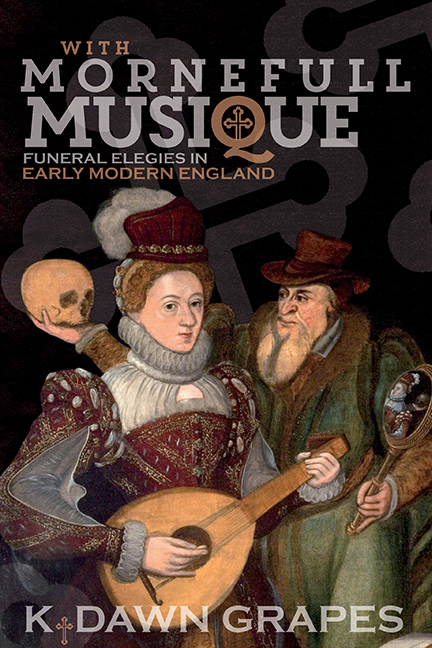 With Mornefull Musique: Funeral Elegies in Early Modern England
With Mornefull Musique: Funeral Elegies in Early Modern England Book contents
- Frontmatter
- Contents
- List of Figures
- List of Music Examples
- Acknowledgements
- Editorial Conventions
- Introduction
- 1 “With Mornefull Musique”: The English Musical Funeral Elegy
- 2 “The Floure of England”: The Earliest Musical Elegies for Sir Philip Sidney
- 3 “Of Griefe and Honour Still”: Elizabethan Courtiers
- 4 “Say Death Hath Lost”: Knights of the Realm
- 5 “Weepe Forth Your Teares”: Laments for a Lost King
- 6 “A Flower of Beutye”: The Feminine Legacy of Queens and Matriarchs
- 7 “For Death of Her”: The Unusual Case of Mary Gascoigne
- 8 “And Music Dies ...”: Musicians and their Stories
- Epilogue
- Appendix: Recordings List
- Select Bibliography
- Index
- Titles listed here were originally published under the series title Music in Britain, 1600–1900
- New titles published under the series title Music in Britain, 1600–2000
5 - “Weepe Forth Your Teares”: Laments for a Lost King
Published online by Cambridge University Press: 17 October 2019
- Frontmatter
- Contents
- List of Figures
- List of Music Examples
- Acknowledgements
- Editorial Conventions
- Introduction
- 1 “With Mornefull Musique”: The English Musical Funeral Elegy
- 2 “The Floure of England”: The Earliest Musical Elegies for Sir Philip Sidney
- 3 “Of Griefe and Honour Still”: Elizabethan Courtiers
- 4 “Say Death Hath Lost”: Knights of the Realm
- 5 “Weepe Forth Your Teares”: Laments for a Lost King
- 6 “A Flower of Beutye”: The Feminine Legacy of Queens and Matriarchs
- 7 “For Death of Her”: The Unusual Case of Mary Gascoigne
- 8 “And Music Dies ...”: Musicians and their Stories
- Epilogue
- Appendix: Recordings List
- Select Bibliography
- Index
- Titles listed here were originally published under the series title Music in Britain, 1600–1900
- New titles published under the series title Music in Britain, 1600–2000
Summary
IF Phillip Sidney's death represents the beginning of musical elegiac fashion, the untimely loss of Prince Henry Frederick, eldest son of King James I, surely marked the peak of elegiac production. The heir to the English throne received more posthumous musical tributes than anyone in early seventeenth- century England. Queen Elizabeth I had brought expectations of the well-rounded courtier to an apex during her reign. In her court, gentlemen excelled at athletics, were versed – if not practiced – in the arts, rallied as soldiers in defense of queen and country, and were grounded in principles of rhetoric and oratory. They were capable of impeccable manners and great charm. A pragmatic man, James I was not as interested in courtly polish. When he took over the throne, the grooming of learned courtiers was de-emphasized, and yet the role that the arts played in celebratory and ceremonial occasions was not diminished, thanks largely to his wife and children. James's eldest son and heir, Henry Frederick, charmed the English people, and was seen by many as a new model for courtly grace. Hopes rested upon the young prince – a fresh personification of English Protestant champion – to resurrect humanist virtues, following in the mold of such heroic courtly figures as Sidney and Robert Devereux, Earl of Essex.
Henry Frederick (1594–1612) received a fine, well-rounded education as a youth, though he seemed rather to prefer sports to books. He took music lessons from Alfonso Ferrabosco the Younger and, once in England, enjoyed the masques favored by his mother, Queen Anne. Sir Henry Lee, who had created a mythology surrounding Elizabeth I through his court entertainments, also worked toward support of Prince Henry through contributions to Anne's productions, and the English people were immediately taken with the young man. Thus, his death by typhoid fever in 1612 was viewed as a national tragedy, one in which the country lost a leading patron of the arts. Roy Strong notes, “Never before had there been such universal grief.” In 1612 and 1613, esteemed authors produced elegies in honor of the prince, books were written, and sermons printed. Over forty anthologies and single-author volumes of poetry paid tribute to Henry in published collections, and many more circulated in private manuscripts.
- Type
- Chapter
- Information
- With Mornefull Musique: Funeral Elegies in Early Modern EnglandFuneral Elegies in Early Modern England, pp. 121 - 153Publisher: Boydell & BrewerPrint publication year: 2018


